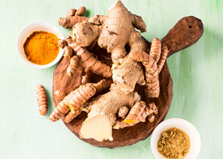
Source:iherb-https://www.iherb.com/blog/8-health-benefits-of-ginger/790?gclid=EAIaIQobChMInqHe5-ap8gIVhpyGCh33vQWlEAAYASAAEgIl9PD_BwE&gclsrc=aw.ds
Ginger is a flowering plant also known as Zingiber officinale. Its root (or rhizome) is a popular ingredient in cooking, but it has also been used for thousands of years for medicinal purposes, particularly in Asian, Arabic, and Indian cultures.
Many of ginger’s professed health benefits have been supported by scientific research:
1. Aids in Digestive Function
Compounds in ginger are known to stimulate bile and saliva production and to increase mobility through the digestive tract. Those who suffer from indigestion may find relief by consuming ginger.
2. May Help Prevent Gastric Ulcers
Gastric ulcers are painful open lesions on the inside lining of the stomach. Use of non-steroidal anti-inflammatory drugs (NSAIDs), like naproxen and ibuprofen, can lead to the development of gastric ulcers. Bacteria called Helicobacter pylori (H. pylori) can also make the gastric lining more prone to ulceration. Ginger, however, inhibits the growth of H. pylori and can prevent the occurrence of stomach ulcers caused by NSAIDs.
3. Reduces Nausea
Ginger has been shown to be effective for relief and prevention of nausea and vomiting related to pregnancy, chemotherapy, and post-operative conditions. While ginger can help reduce nausea induced by motion sickness, it seems to have no effect on the prevention of vomiting caused by such.
Consuming 1 to 1.5 grams of ginger (or 1 to 2 small- to medium-sized pieces of crystallized ginger) can help provide relief for these various types of nausea.
4. Decreases Pain and Inflammation
There is evidence that ginger can be beneficial for pain management. By helping to reduce inflammation of joints, ginger can decrease pain associated with arthritic conditions. Daily supplementation of ginger can also improve exercise-induced muscle pain. Women who experience severe pain during menstruation may find some relief with the consumption of ginger as well.
5. Promotes Sweating
Ginger is a diaphoretic, meaning that it can stimulate sweating, which allows your body to eliminate toxins. After taking ginger there may be a sense of warming from within, which is why it is popular for soothing symptoms of colds and flu.
6. Improves Cognition
With antioxidant and anti-inflammatory properties, ginger can mitigate age-related cognitive decline. There is evidence that ginger can enhance attention and cognitive processing.
7. May Lower Cholesterol
There are studies that have demonstrated significant reductions in LDL cholesterol and blood triglyceride levels associated with the consumption of ginger.
8. May Lower Blood Sugar
Ginger has been shown to lower blood sugar levels in type 2 diabetic individuals. In the same study, HbA1c (a marker used as an indicator for long-term blood sugar control) also improved. While these are promising results, more research is needed to confirm this benefit.
Tips for Taking Ginger
There are many options for consuming ginger. It can be found fresh and dried. It is available in capsules, tinctures, and lozenges. There is also ginger oil and ginger extract.
Side effects of ginger are rare. However, if you take excessive doses, you may develop heartburn, diarrhea, or mouth irritation. Avoid ginger if you have a bleeding disorder. Before starting ginger supplementation, check with your healthcare provider if you plan to take it regularly, if you have gallstones, or if you are on any blood-thinning medication.

